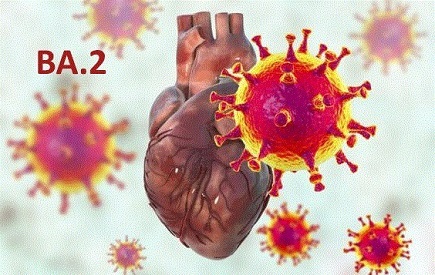Omicron BA.2 Sub-Lineages Target And Damage Cardiomyocytes More Efficiently Than Any Other Variants!
Nikhil Prasad Fact checked by:Thailand Medical News Team Feb 19, 2024 1 year, 1 month, 3 weeks, 6 days, 20 hours, 8 minutes ago
COVID-19 News: In the ongoing battle against the COVID-19 pandemic, researchers have continuously delved into understanding the behavior and impact of various SARS-CoV-2 variants. Recent findings from the Chinese University of Hong Kong shed light on a concerning aspect: the divergent ability of different variants to infect and damage cardiomyocytes (CMs), the cells responsible for the heart's contraction and relaxation.
 Omicron BA.2 Sub-Lineages Target And Damage Cardiomyocytes
Omicron BA.2 Sub-Lineages Target And Damage Cardiomyocytes
More Efficiently Than Any Other Variants
The study covered in this this
COVID-19 News report, led by Dr Mok Wing Yee, Bobo from the department of microbiology at the Chinese University of Hong Kong, aimed to explore how different SARS-CoV-2 variants affect cardiomyocytes or CMs, using both animal models and human-derived cell cultures. Their study findings revealed a striking difference in the behavior of Omicron BA.2, a sub-lineage of the Omicron variant, compared to other variants.
While previous research primarily focused on the respiratory effects of SARS-CoV-2 variants, the impact on the heart remained unclear. To address this gap, the researchers utilized Golden Syrian hamsters and human-induced pluripotent stem cell-derived CMs as experimental models.
Findings Showed That Omicron BA.2 Sub-Lineages Target And Damage Cardiomyocytes More Efficiently Than Any Other Variants
What they discovered was alarming: Omicron BA.2 exhibited a unique ability to efficiently infect CMs both in vitro (in laboratory conditions) and in vivo (within living organisms), resulting in the most severe cardiac damage compared to other variants studied.
Moreover, transcriptomic analysis revealed that Omicron BA.2 induced significant pro-inflammatory responses in cardiomyocytes (CMs), along with heightened cardiac dysfunction. These molecular changes suggested a more aggressive phenotype, potentially explaining the increased severity of cardiac damage observed.
One notable aspect contributing to the heightened infectivity of Omicron BA.2 was its ability to infect cardiomyocytes or CMs independently of TMPRSS2, a protein that facilitates viral entry and is absent in cardiomyocytes or CMs. This finding underscored the unique mechanisms by which this BA.2 variant targets cardiac tissue, setting it apart from other variants.
To corroborate their findings, the researchers conducted a pilot study involving patients infected with Omicron BA.2 in Hong Kong. Analysis of plasma troponin levels, a marker of myocardial injury, revealed significantly elevated levels in these patients, consistent with severe cardiac damage.
These study findings have profound implications for both clinical practice and public health strategies. Despite Omicron BA.2 being generally considered a mild variant, its ability to induce severe CM damage highlights the importance of vigilance and thorough monitoring of COVID-19 patients, especially those exhibiting cardiac symptoms.
Furthermo
re, understanding the unique mechanisms by which Omicron BA.2 targets CMs can inform the development of targeted therapies and interventions to mitigate cardiac complications associated with SARS-CoV-2 infection.
In conclusion, the study from the University of Hong Kong provides critical insights into the divergent effects of SARS-CoV-2 variants on CMs, with Omicron BA.2 emerging as a particularly concerning threat to cardiac health. As the COVID-19 pandemic continues to evolve, ongoing research efforts are essential to stay ahead of the virus and protect vulnerable populations from its devastating consequences.
The study findings were published as an abstract in the peer reviewed journal: Circulation Research. (A Journal of the American Heart Association).
https://www.ahajournals.org/doi/10.1161/res.133.suppl_1.P2195
For the latest
COVID-19 News, keep on logging to Thailand Medical News.
